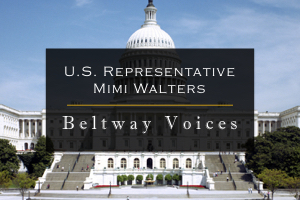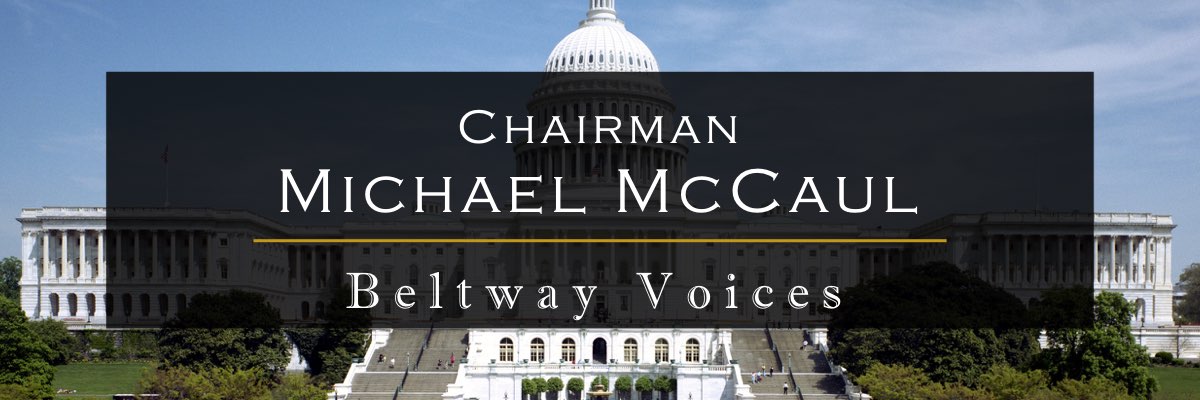Home to many of the world’s most iconic technology companies, California is the global innovation hub. Representative Mimi Walters (R-Calif.), whose Congressional district is based in Orange County, understands that the work of software developers drives the 21st century economy. Representative Walters is working hard to use her business experience to foster an environment conducive to investment, innovation, and entrepreneurship.
Representative Walters was first elected to the Laguna Niguel City Council in 1996, later serving as mayor. She has also served in the California State Assembly and State Senate before her election to Congress in 2014. In her first term, Representative Walters has already positioned herself as an influential leader on technology issues, serving on the powerful House Judiciary Committee that has recently considered important reforms relating to patent litigation, email privacy, and transatlantic data flows. Representative Walters also serves on the Transportation and Infrastructure Committee, co-chairs the Congressional App Challenge, and is a member of the Congressional Internet Caucus.
As part of our Beltway Voices series, we caught up with Representative Walters to discuss a variety of issues important to developers.
Application Developers Alliance: Patent litigation reform continues to be a priority for innovators, especially for small- and medium-sized companies that might not have the resources to defend themselves against patent trolls. Patent trolls, entities that don’t create anything or help to grow the economy, often use overly broad, never-should-have-been-issued patents as weapons to shakedown legitimate innovators. Trolls chill innovation and kill many new and exciting companies in the cradle. As a member of the House Judiciary Committee, you supported H.R. 9, the Innovation Act, when it was considered by the committee a year ago. Why hasn’t the bill been considered by the entire House of Representatives yet? What more needs to be done for the bill to receive a vote on the House floor? Do you anticipate a vote anytime soon?
Representative Mimi Walters (R-Calif.)
Representative Walters: The rise in frivolous patent litigation is in large part attributed to patent trolls, and we must do more to stop their harmful, wasteful litigation. These patent trolls never intend to use their patents to develop a product; instead they assert the patent against an alleged infringer either through a demand letter or a lawsuit. This is essentially legal extortion, and it has the detrimental effect of stifling innovation and preventing legitimate advancements. Most agree that the Innovation Act would deter most patent trolls, but there are concerns that this legislation is written too broadly and could inadvertently hurt other industries that depend on strong intellectual property rights, like the life sciences industry. There are ongoing efforts to address those concerns and chart a path forward that would incentivize all the concerned industries to continue to innovate. On the Judiciary Committee, we are focused on encouraging innovation that is vital to our economy, and so we are actively working on ways to improve this bill and stop patent trolls.
Application Developers Alliance: Software provides untold benefits to society. Whether it is technology in the classroom, wearables, or medical devices that send real-time updates to doctors, without question software is making our world a better place. With these benefits often comes the collection of data, which can sometimes be personal in nature. There are instances in which lawmakers and other regulatory agencies have called on innovators to limit data collection for fear that the data could be compromised by bad actors. Software developers know how important good data stewardship is, frankly because the future of their businesses depend on it. What role should Washington be playing in this space?
Representative Walters: A challenge we face in Congress is that government moves at a very slow pace compared to the rapid advances in the tech world. Members of Congress are beginning to understand the untapped benefits that lie in the ever-growing mass of data that is being created each day. In that data lays patterns and nuances that, once identified, could result in amazing advancements and breakthroughs. Yet, we must also recognize that this data can reveal sensitive personal information. Washington’s role is to listen to the American people in order to answer the question, “Who owns the data?” Does the company that created the software own it, or does the person whom it was collected from own it? These are questions that our society needs to debate and ultimately decide upon before we can develop a comprehensive governance scheme. Congress is going to be the forum in which we develop what our societal expectations are regarding that data.
We understand that software developers want to keep the personal information they receive safe, but we are engaged in a constant battle to protect our networks, systems, and data from exploitation and cyber-attacks. This is not just an issue for software developers. This challenge spans from the most sensitive national security functions, to the free functioning of the global economy, to the protection of your personal information. To further complicate matters, we are dealing with modern technology that advances much faster than the government and the legislative process. I sit on the Judiciary’s Subcommittee on Courts and Technology and can tell you that these debates are complicated by the fact that the technology is not always understood. In Washington, we are working to update the laws on the books, and we are looking forward to where technology is going and where our laws will need to be.
Application Developers Alliance: The Internet of Things is changing the world by the minute. For example, driverless cars already have the capability of “communicating” with stop lights, street signs, and crosswalks. What steps is Congress taking to make the widespread deployment and adoption of IoT a reality, particularly as it relates to transportation? Are there specific areas you would like to see addressed? What role is the Transportation and Infrastructure Committee playing to tackle these challenges?
Representative Walters: This March I had the honor of being on a South-by-Southwest panel called “Innovation Infrastructure: IOT in the Public Space,” which focused on how we adapt the Internet of Things to our society. One of the discussion topics was how we set policy to allow innovations, such as driverless cars, to flourish. That debate included policy areas like spectrum availability and cloud computing. As I have mentioned, we need to find a way to make sure our laws consider how quickly technology changes. The FAST Act, which went through the Transportation and Infrastructure Committee and was signed into law last December, establishes a grant program to examine advanced transportation technologies, including those associated with autonomous vehicles. Congress also recognized that federal, state, and local agencies should be prepared for the future integration of driverless cars into our transportation network.
Application Developers Alliance: Strong, robust encryption is a developer’s best tool to protect Americans from online hackers, thieves, and other bad actors. In recent months, the encryption debate has taken the country by storm, prompting a knee-jerk proposal in Congress to deliberately weaken data security. Other lawmakers have taken a different approach, and a proposal by House Homeland Security Chairman Mike McCaul (R-Texas) and Senator Mark Warner (D-Va.) would create a commission comprised of policymakers and industry experts to study this complex issue. You have co-sponsored that legislation. Why is it important to take a balanced, reflective approach to encryption? What do you hope this commission will accomplish? What are the bill’s prospects in Congress?
Representative Walters: We first need to recognize that this is an incredibly difficult issue. This debate goes to the heart of what our Founders discussed when developing the Fourth Amendment. The struggle between liberty and security has been a constant in our society. We know that modern technology advances much faster than the legislative process. Now, the creation of a commission is often considered Congress passing the buck on hard decisions. I think the McCaul-Warner Commission is an exception to that rule. We absolutely need to have the technical experts at the table while we create a solution to this difficult issue. I think the path forward is to bring together experts in law enforcement, intelligence, technology, and privacy to provide recommendations on how we can develop solutions, and that is why I cosponsored this legislation.
Application Developers Alliance: According to a recent report, while 57% of professional occupations in the 2015 U.S. workforce were held by women, only 25% of IT-related jobs were filled by women, and women accounted for only 17% of Fortune 500 Chief Information Off
icers. In 1994, you co-founded the California Women’s Leadership Association to help put women in “key positions of leadership.” What can be done to help diversify the rapidly growing IT workforce, and how can we cultivate the next generation of women leaders in the industry?
Representative Walters: I am a member of an Innovation Initiative established by House Majority Leader Kevin McCarthy that is focused on passing legislation that will incentivize discovery, creation, and advancement in order to move our economy forward. In fact, the House has already passed H.R. 4755, the Inspiring the Next Space Pioneers, Innovators, Researchers, and Explorers (INSPIRE) Women Act. Introduced by Representative Barbara Comstock of Virginia, this bill would direct NASA to encourage females to study STEM subjects and pursue careers in aerospace through various initiatives. By encouraging young Americans to study subjects focused on science and technology, we are ensuring our nation to remain at the forefront of innovation.
Geoff Lane
U.S. Director of Policy and Government Relations







